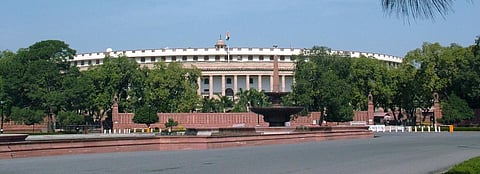

Amid increasing air pollution in Delhi, Parliament on November 21, 2019 debated on the poisonous air outside. A day earlier, the parliamentary standing committee on urban development met to discuss the role of various agencies to combat air pollution.
Rajya Sabha members raised an array of issues, from stubble burning to plantations, and made several suggestions.
National Congress Party’s (NCP) Vandana Chavan proposed that every city should have an urban forest to sequester carbon. Vir Singh of Bahujan Samaj Party suggested planting trees along highways.
Environment minister Prakash Javadekar also stressed on planting trees and increasing the green cover to reduce air pollution.
The Supreme Court has already asked the government to explore options such as anti-smog towers to purify air in a 10 kilometre radius.
Important and simpler recommendations to tackle causes of critical air pollution, especially in the winter, have been ignored in the past.
A report by a parliamentary panel on science and technology and environment and forests (tabled August 7, 2018) on air pollution in Delhi and the National Capital Region (NCR) recognised depletion of forests as a main cause.
The absence of green belts around Delhi and surrounding areas let dust storms from neighbouring states enter Delhi, it said. The report recommended a massive, time-bound tree plantation exercise on the borders of Delhi with Haryana, Rajasthan and Uttar Pradesh to absorb pollution-causing particulate matter (PM).
Something like this can absorb ultra-fine PM2.5 from stubble burning in Haryana and Punjab that travel to Delhi via north westerly winds. No concrete step has been taken yet.
It also proposed that the Ministry of Environment, Forest and Climate Change (MoEFCC), in consultation with state governments, plant trees along the western and eastern peripheral expressways.
Talking of stubble burning, it had noted that weak enforcement of the statutory ban by Punjab, Haryana and UP governments, coupled with lax sensitivity, adversely affected ongoing efforts.
The panel acknowledged that subsidy schemes to promote disposal of agricultural residue in a scientific manner did not help much; it expressed surprise that no scientific study was undertaken by any state or the Union government to ascertain the level of damage caused by burning stubble.
Mentioning dust pollution in Delhi, the committee took note of the number of mechanised road-sweeping machines to curb road dust in Delhi-NCR. The impact of such machines was visible only in select areas, it said and called for an urgent increase in their number.
More than a year later, all roads were still not being cleaned by machines; they were not being used optimally.